
Hey Kids, we had the pleasure of chatting with director Harold Ramis, founding member of SCTV and writer of Animal House, Stripes, National Lampoon’s Vacation and Groundhog Day. Mr. Ramis dropped by to discuss his latest film, Year One and talk about his amazing comedy history, where one should stop a Biblical comedy and why it sucks to be the fourth Ghostbuster.
Dig it!
Year One
Director Harold Ramis
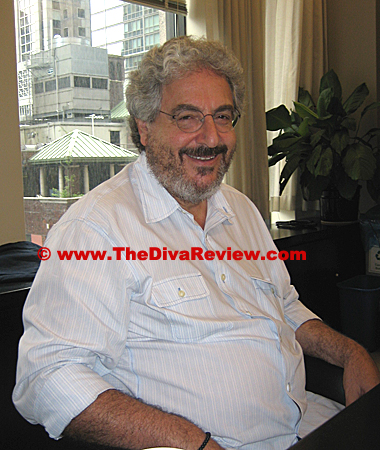 The
Lady Miz Diva: You mentioned at the film’s premiere last night that
Year One was the best time you ever had working on a film. Why is
that? How was it different from other films you’ve made?
The
Lady Miz Diva: You mentioned at the film’s premiere last night that
Year One was the best time you ever had working on a film. Why is
that? How was it different from other films you’ve made?
Harold Ramis: Every film that I’ve written, it starts in your head: You sit down and you start writing something. I’ve started a film set on a fictional Caribbean island; it’s a fantasy that you’ll ever get to make it. I don’t know what it is for people who don’t work in comedy, but in comedy you look forward to the possibility of, one, realising the fantasy you put down on the paper, and two, fleshing it out with the funniest, nicest people you can find. Ninety-nine percent of the screenplays that are written don’t get produced and those are unfulfilled fantasies; but when you write a fantasy - especially an epic fantasy - and then responsible adults say, “Yeah, we’ll put up the money for this,” you go, “Wow!” I’m already ahead of the game.
I live in hope, so my current work is always my favourite work, because I hope it will teach me something I didn’t know before, or I’ll have some experience I’ve never had before. If this was television and I worked seven years doing the same show over and over, you’d pretty much know what to expect, but every feature film is like a grand adventure, and you go on it with new people every time. Jack Black and Michael Cera are amazing allies to have. I had Judd Apatow with me in spirit and certainly as an ally back in LA just covering everything for me, and just a wonderful cast and I have great staff and people I’ve worked with behind the camera. It’s the nicest job I can imagine having, and this film in particular, the journey itself. I’ve made one other journey film, National Lampoon’s Vacation, a lot of fun traveling with the whole crew. It’s like being in the circus. The ideas in this film, as silly and broad as the movie is, the kind of intellectual and philosophical underpinnings are so meaningful to me, it gave me a chance to explore these ideas at least in my own head. Whether they translate to the audience, or not, I dunno.
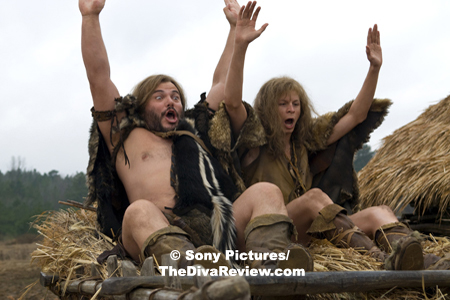 LMD:
When did you figure out when to stop the journey? I could see Zed and
Oh continuing on all through the Old Testament.
LMD:
When did you figure out when to stop the journey? I could see Zed and
Oh continuing on all through the Old Testament.
HR: That was sort of a big question that was raised by the studio and by the thousand people that gave us script notes; ‘Should we include the Exodus?’ It sounds crazy, but I said, “No, the Exodus is way too late.” Exodus is about 1200 BC, Abraham is about 2000 BC. But of course, in the film we leap from the Garden of Eden; if you were an Orthodox Jew you’d say the Garden of Eden was 5,769 years ago. If you were an evolutionary biologist you’d say the hunter-gatherers were about 10,000 years ago. Quibbling about time might seem silly given the leaps we make in the film. We had a focus group after one of our test screenings and some of the folks said, “Well, how could they meet Cain and Abel and then meet Abraham, who was 1,000 years after them?” And I said, “Oh, you mean the real Cain and Abel. This is a totally different Cain and Abel.” I mean, we’re in fantasyland, anyway. Genesis starts off as mythology; not unlike any other set of mythologies, Greek or Mesopotamian, and then Genesis turns into legend, things that may have happened. About as much is known about Abraham as there is about Robin Hood, but it represents a history that you can kind of track. Then the Bible turns into literal history, you can start dating things in the real world. So, I thought as long was we’re in the myth and legend period, I’m free to have the Tower of Babel. If we could have afforded to make the Ziggurat higher in Sodom it would’ve been the Tower of Babel {Laughs}
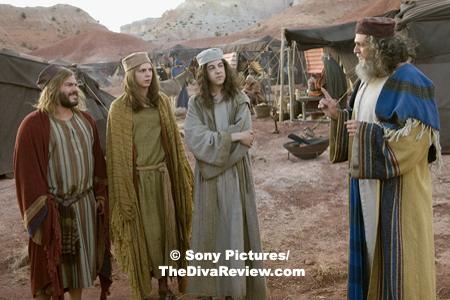 LMD:
I wondered if you left it at that point to make room for a possible Year
2?
LMD:
I wondered if you left it at that point to make room for a possible Year
2?
HR: Our joke was the sequel will be called Year One, Two. {Laughs} Whenever I’ve made a film, I’ve never seriously thought about a sequel. I wasn’t exploring Bible stories because I think those stories were funny; I was trying to explore Genesis in the context of some political, social and psychological ideas that I have. So, in my mind, having dealt with those, I don’t need to do that again. If the public wanted to see more funny Bible stuff, I suppose Sony would get someone else to do the Moses section.
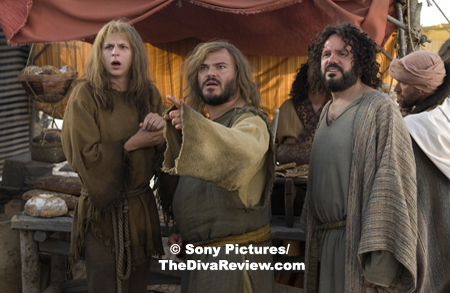 LMD:
You have a very funny supporting cast and many of your bit players are
comedians. With all that talent around, how do you decide how much time
you’re going to spend on each character?
LMD:
You have a very funny supporting cast and many of your bit players are
comedians. With all that talent around, how do you decide how much time
you’re going to spend on each character?
HR: That kind of relates to Ghostbusters in a way: Ernie Hudson was new to the comedy world, being the fourth Ghostbuster. He’s a serious actor and a really good actor and would have ideas, and he’d try to talk to {director} Ivan Reitman and Ivan would go, “Yeah, yeah, yeah,” and kind of put him off. And I could see how disappointed he was and he once said to me, “I think Ivan doesn’t like me.” I said, “No, no, no, no, Ivan really likes you, but here’s how it works: Bill gets this much money and is the headliner. Danny {Aykroyd} gets a little less than Bill, but he’s the second headliner. And then I get a lot less, but I’m like third because I actually wrote the script and you’re fourth guy. So, when there’s a really wide shot, we’re all in it if Ivan cares what we’re all doing. If the shot’s a little less wide, you’re out. {Laughs} And if it’s a two-shot, it’s not gonna be me and Bill, it’s gonna be Danny and Bill.” So, there are pecking orders, you can only spend a certain amount of time. I’ve had day players; people who are in the movie to do a small scene, or a couple of scenes, to them that’s their chance, that’s their shot, it’s like they’re playing Hamlet all of a sudden and they wanna talk to you about their character. You can only go so far, there’s only so much time. Oliver {Platt} for instance, he loves to talk about his characters, he’s very serious about it and really thinks things through and it’s fun to talk to him, but it’s comedy. At Second City, the producer Bernie Sahlins, once said, “In comedy, you wear your character lightly, like a hat. You just kind of put it on your head and you do it.” So, you don’t wanna spend too much time overthinking these things, but you wanna give each actor what he needs. Most of these comedy people, you just put them up there and they go. In general, most funny films, they’re funny because they have great comic performances at the heart of them. So, you recruit for that reason, someone that’s gonna make you laugh, but most of them they know they’re place in the film. They know that the whole thing is not gonna stop and revolve around their moments.
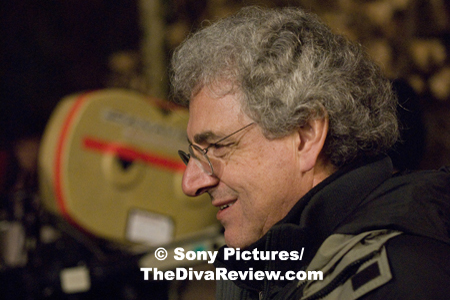 LMD:
Is it more comfortable as both a comedian and director to have other
comedians around you?
LMD:
Is it more comfortable as both a comedian and director to have other
comedians around you?
HR: Well, in a comedy, I mean if you’ve got funny lines to deliver, sometimes you don’t know who’s gonna be funny. We trust our casting directors to bring in everybody who’s got a reasonable shot at making it work. We see tons of people. I saw Andy Samberg at the party last night and I forgot he auditioned for the movie. Almost everyone on SNL came in and auditioned for very small parts, they just wanted to kind of join the party, but in the end they didn’t hire ‘em, not cos they weren’t funny, but because I thought, “God what am I gonna do with Andy Samberg on the set? There’s really not enough for him. If you had him, you’d really wanna turn it into something.”
LMD: Having worked in Second City and SCTV and having an orbit around the Saturday Night Live guys, you have a long history in comedy. Year One is your first project with Judd Apatow and his crew of funny people. Can you talk about the different approaches to the styles of comedy and what you took away from this latest experience?
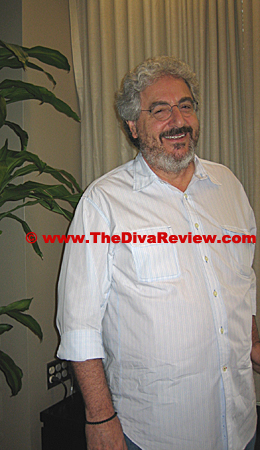 HR:
When I started in comedy, there was a great schism. There was old
school and new school. Old school was stand-ups who had been
conditioned by the Borscht Belt and Vegas and Hollywood, that kind of
slick, Vegas style, and it was kind of generational. The kind of people
our parents laughed at; and it could be very funny, from old Jewish
comedians like Myron Cohen. Rodney Dangerfield came out of that
tradition and modified it. Lenny Bruce was like the great rebel of the
stand-up tradition. Lenny stood on the street corner as a teenager with
Rodney Dangerfield and Joe E. Ross, who later turned up in television,
Car 54, Where are You? Lenny invented what they called “the shpritz,”
which was just kind of an angry hipster rap, fueled by lots of marijuana
and a lot of cynicism and a lot of angry political feelings. So, that
was the beginning of something new. When I was 16 years old, I went to
a nightclub in Chicago called The Gate of Horn and I saw Lenny Bruce
live and he was arrested on his very next engagement in Chicago, taken
off the stage. It began his series of arrests and first amendment
trials that ended his career and his life; he got so depressed and so
serious about it he finally overdosed.
HR:
When I started in comedy, there was a great schism. There was old
school and new school. Old school was stand-ups who had been
conditioned by the Borscht Belt and Vegas and Hollywood, that kind of
slick, Vegas style, and it was kind of generational. The kind of people
our parents laughed at; and it could be very funny, from old Jewish
comedians like Myron Cohen. Rodney Dangerfield came out of that
tradition and modified it. Lenny Bruce was like the great rebel of the
stand-up tradition. Lenny stood on the street corner as a teenager with
Rodney Dangerfield and Joe E. Ross, who later turned up in television,
Car 54, Where are You? Lenny invented what they called “the shpritz,”
which was just kind of an angry hipster rap, fueled by lots of marijuana
and a lot of cynicism and a lot of angry political feelings. So, that
was the beginning of something new. When I was 16 years old, I went to
a nightclub in Chicago called The Gate of Horn and I saw Lenny Bruce
live and he was arrested on his very next engagement in Chicago, taken
off the stage. It began his series of arrests and first amendment
trials that ended his career and his life; he got so depressed and so
serious about it he finally overdosed.
So, Lenny was the beginning of something new and Mort Sahl was taking a more acrid kind of political approach to things, but the new comedy had not emerged. Second City was the birth of the new comedy that kind of took Mort Sahl’s satire, allowed for a kind of Lenny Bruce liberal use of language and social attitude and put it on the stage and made it popular, and that’s what Lorne Michaels brought to television. For Lorne Michaels, the National Lampoon had a big part to play; the Harvard Lampoon was very funny, much broader and crueler than Second City. Lampoon went National, the magazine, then the Lemmings show, and we had a stage show and a radio hour. And Lorne Michaels just kind of cherry-picked from Second City and the other improv companies; Laraine Newman from Groundlings, but Gilda {Radner}, John Belushi and Bill {Murray} were Second City, Chevy Chase was Lampoon, Christopher Guest was Lampoon, too, who ended up on Saturday Night. So, that became the new comedy. Saturday Night announced its arrival on television, Animal House was the first entry into films, Caddyshack was the second. Our press junket was such a disaster on Caddyshack, someone wrote, “If this is the new Hollywood, let’s have the old Hollywood back.” But more than being the new Hollywood, we were the new comedy, I think, and it was dubbed that way.
I grew up on the Marx Brothers and those old Borscht Belt stand-ups. Judd grew up on the new comedy, basically. Also, I’m totally neglecting the British tradition, which has always been great, Peter Sellers, Ealing and Boulting Brothers, Peter Cook and Dudley Moore, and Monty Python. There’s a stream there that’s very significant for a lot of people. So, I’d lost touch with the Judd generation; I knew they were out there, I knew they were talking about our stuff, that they’ve grown up on it. Judd and I finally met. He says he and Seth Rogen stalked me at the Deauville Film Festival in France, but we were in the same hotel, they called me and asked me for a drink. So, they came to my film, The Ice Harvest and we had dinner, and I went to their film, The 40 Year Old Virgin and had dinner and we came out of it friends. Judd asked me to appear in Knocked up as Seth’s father and that kind of cemented something for both of us. Also, I’d already appeared with Jack in Orange County; {director} Jake Kasdan, even though he’s Larry Kasdan’s son, he was also from the Apatow school, cos he had directed Freaks and Geeks and Undeclared. That was the beginning, then it kind of cemented my place in their world with Knocked Up. Then I asked Judd to produce this movie with me as a desperate attempt to really connect with that whole generation. {Laughs} I knew it would be an important collaboration.
~ The Lady Miz Diva
June 16th, 2009
Click Here for our Review of Year One
© 2006-2022 The Diva Review.com
|
|